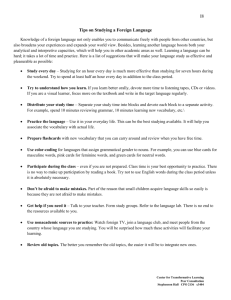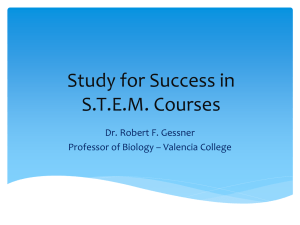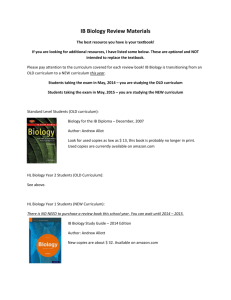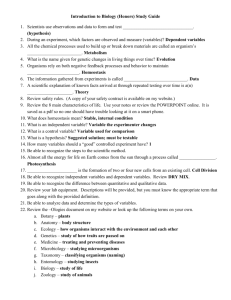Study for Success in Biological Science Courses
advertisement
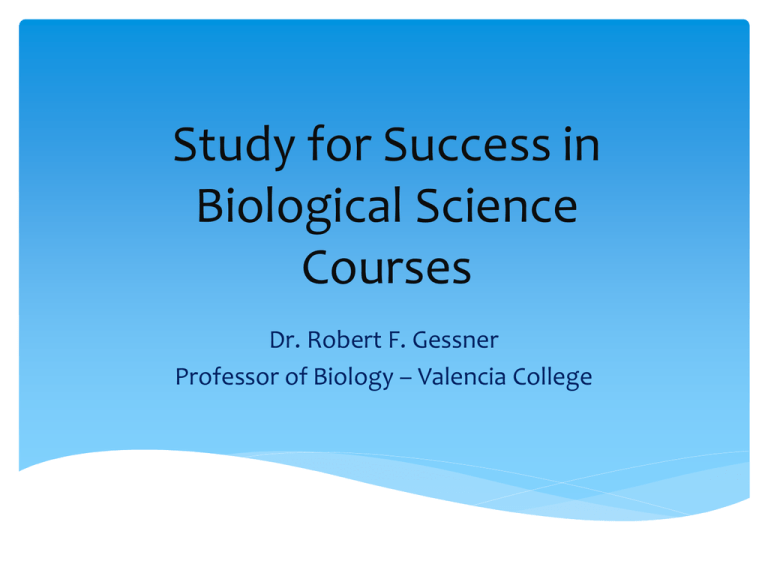
Study for Success in Biological Science Courses Dr. Robert F. Gessner Professor of Biology – Valencia College The first step in succeeding in a biology class happens before you even sign up for the class! Before your sign up for a biology class, you need to determine whether you have enough time to devote to the class. 1) A typical biology class, with a lab, is worth 4 credit hours, but has 6 contact hours per week. - That means you should expect to spend at least 12 hours/week studying. - One major reason students do not succeed in biology classes is they don’t have time to devote to a thorough understanding of the material in the class. - You should look at your other time commitments to determine when you should take your biology classes. Once you have determined that you have the ability to devote the necessary time to studying in a class, how do you determine the best professor for you? 1) References from your peers. 2) References from your professors. 3) myedu.com (How should you use grade distribution reports?) 4) Ratemyprofessor.com (How should do you use these reports?) When choosing a professor, it can also help to know what type of learner you are: a) Visual* b) Kinesthetic* c) Verbal* d) Reflective e) Gustatory f) Factual/linear g) Theoretical/global At this website, you can take a survey to determine your learning style and get tips to help you study more effectively. http://people.usd.edu/~bwjames/t ut/learning-style/ Many people have multiple learning styles, and your professor may not teach to your learning style strengths. The trick is to maximize the skills you use with your own learning style while working to become better at other learning styles. THE FIRST DAY OF CLASS Either before or on the first day of classes, READ THE SYLLABUS! - Don’t sit in the back of the class. - Don’t sit near windows or doors. - Don’t sit with your friends. - Sit where you can see and hear the professor. - Make sure you are on time to every class. Learning is an action verb, you have to do more than sit through classes(passive) and reread the notes(passive) to do well in science classes. Simply rereading your notes over and over is not studying. If you can’t teach someone the subject you are learning, you don’t know it. So how do you study? Read the materials that will be covered in class BEFORE THE CLASS MEETS. If your professor allows, tape record the class and within 24 hours of a class, rewrite your notes. After that, every day, read over each difficult concept in your notes, put away your notes and write as much as you can remember from memory. Check to see what you knew and what you didn’t know. Do that every day for each difficult concept until you can teach someone else about the subject. Use flashcards! 1) For vocabulary words 2) To predict questions and answers on tests 3) To remember lab concepts Use mnemonic devices, make up songs and rhymes to remember concepts. Know root words, prefixes and suffixes; they are a major key to understanding the language of science. How do you remember the difference between Prokaryotes vs. Eukaryotes? Make connections between the concepts you are learning. Compare and contrast concepts. For many students, making a chart or table works to put the concepts you learn into an organized format to recall information. How do you remember these levels of classification? Make lists of topics that you don’t understand and: 1) go see your professor and ask questions during office hours or in class 2) join a study group and exchange phone numbers or use social media 3) sign up for a tutor 4) go online to Google definitions and concepts and go to Google Images 5) go to khanacademy.org or watch You Tube videos For labs, read the materials before lab. After each lab, make a journal which answers 4 questions: 1) What did you use in each lab? 2) What did you do (the procedures) in each lab? 3) What did you see in each lab (the results)? 4) Why did you see what you saw in each lab (explain why the results turned out as they did)? Every day, for each lab, write the answers to each of these questions from memory, until you no longer have to refer back to the journal to recall the answers. - If you can, relate what you are learning to things you already know. - Study with a purpose. Make lists of questions and try to answer the questions from recall. - Science reading isn’t like reading a novel; you must understand every word in a sentence before you can go on to the next sentence. If you don’t know a word in a sentence, LOOK IT UP! What about your study environment? 1) Make studying a habit at a certain place and time of the day 2) Your study area needs to be organized and free of distractions 3) Limit the chance for interruptions 4) Don’t study when you are hungry or full 5) Don’t study if you are tired 6) Don’t study if you are stressed out (Baycare Behavioral Health’s confidential student assistance program is for you: (800) 878-5470) Break study time into “chunks” of time. If you have other things on your mind or begin to daydream, stand up and walk around for 10 seconds, let your mind wander and then return to your studies. Vary study activities: read a little, write a little, speak a little TEST TAKING 1) Each question should be read slowly and carefully, looking for key words. 2) Answer the easier questions first and then come back to answer those you find more difficult; other questions may have hints that will jog your memory. 3) Change multiple choice answers at your peril; usually your first response is right. 4) Eliminate as many answers as possible if you are stuck on a multiple choice question, then guess if you must. 5) Be aware of the time and go through higher point value questions first. 6) For essay questions, use specific words and not words like “it”, “those” and “things”. 7) Learn to spell your new vocabulary words; in medicine, a minor misspelling can mean the difference between life and death. Learning science is like learning a new language. To learn languages, you need to immerse yourself in the “culture” and speak and write the language often. Remember, your college classes are an investment in your future. It is critical that you learn for long-term memory and not cram for tests and quizzes. Each successive science class builds upon the knowledge from the previous classes and you will be expected to know the information you learned from previous classes. Studying can be done the right way or the wrong way; ultimately, your success depends upon you. Which emotion do you want to feel at the end of each course? As a nursing or allied health student, do you know that the following are expected of you once you enter your program of study? 1) You must have strong critical thinking skills in order to apply your skills and knowledge to a variety of unpredictable circumstances. 2) You must be willing to be a lifelong learner since continuing education is a professional requirement. 3) You must be able to communicate in a professional manner in person, online and in group settings. 4) You must be able to keep patient information confidential. 5) You must follow directions and regulations as if you were in the military. 6) You performance in courses like Microbiology ad well as Anatomy and Physiology is somewhat predictive of how well you will perform in nursing and allied health courses. 7) The exams you take will be on materials that are not covered verbatim in the lectures or textbooks. 8) You may have to practice basic skills for hours on end in the lab until you perfect them. 9) You must be on time and attend every class, dress professionally, and be prepared for every class. 10) There is no grade forgiveness or extra credit, nor are there any study guides. 11) You will fail a course if your grade is less than 77%. 12) In Nursing I, you will be in class 18 hours per week and will be expected to spend at least 30 hours per week studying. 13) You will need to get a 92% on dosage calculation exams at each level of the nursing program to progress through the program. 14) You must have basic computer skills. 15) You may have to wait up to 2 years to get into your program, during which you will be expected to keep current on the knowledge you learned in pre-requisite courses. 16) While in school, you will not be able to work more than 20 hours with an outside employer. You will need support systems in place (babysitters, back-up rides, etc.) HAVE YOU EVER JOB SHADOWED, VOLUNTEERED, OR INTERNED in the job that you one day hope to have? IF NOT, YOU COULD BE IN FOR A BIG SURPRISE!!! (one which you may not like) CONSULT WITH A CAREER PROGRAM ADVISOR. 1) When you get a job, you may be required to get immunized against infectious disease. (Some employers allow you to opt out, but you will need to wear a mask during your entire shift) 2) You may need to work on your feet for up to 12 hours a day, while working some holidays and weekends. 3) You will be exposed to the “den of infection, the pit of pestilence and the crypt of contagion.” You will be exposed to body odors and fluids. You will have to deal with grief, loss and dying patients. 4) You will have to deal with stressful and distracting situations. 5) You cannot be judgmental about patient’s moral decisions, socioeconomic situation or sexual preferences. 6) You must work well with a team to care for your patients. QUESTIONS? This PowerPoint presentation can be found on Dr. Gessner’s Faculty FrontDoor website, under “Course Materials.”
